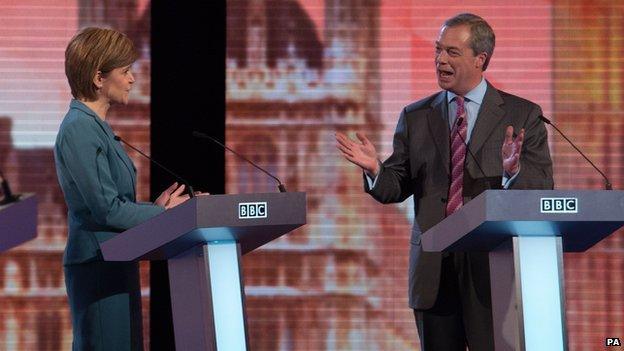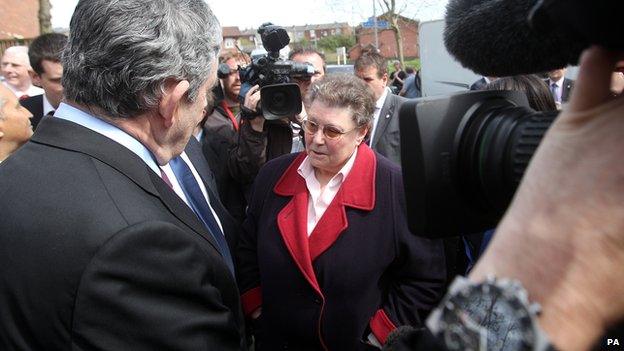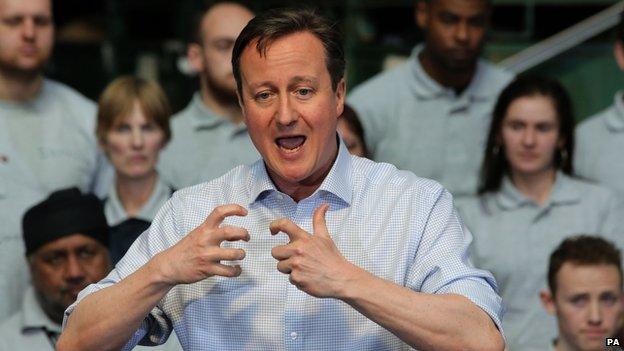The vanilla-flavoured election
- Published
- comments

It seems odd. The most nail-biting election for decades and yet the campaign itself is deemed boring and uninspiring.
There is no contradiction here, though. For Conservative and Labour, the very closeness of the race means that they would rather be dull than bold. Better vanilla than raspberry ripple.
The safety-first principle explains why Messrs Miliband and Cameron are rarely seen interacting with ordinary voters. Their days are spent moving from one stage-managed event to the next, teams of spin-doctors and apparatchiks trying to ensure every risk is neutralised.
We shouldn't be surprised tax and spending plans are a bit woolly. Election strategists calculate it is better to be accused of vagueness than offer specifics. There is more danger in the detail. If they were to reveal their full hand, an army of fact-checkers and number-crunchers would go through every line ready to expose some damaging error or inconsistency.
Social media has upped the stakes. One injudicious comment or one factual inaccuracy could explode into a Twitter storm that might derail the entire campaign. Better not to say anything interesting at all.
There is a downside to this strategy, of course. The public is convinced that the next prime minister will be a boring bloke in a suit who lacks passion and personality. It is a view that plays strongly to the idea that a callous Westminster elite, hard-hearted and uncaring for ordinary concerns, holds the power in this country.
We yearn for old-fashioned political passion, candidates prepared to wear their hearts on their sleeves. But for the major parties, the calculation is that to do so would leave them dangerously exposed in a hostile public sphere that can destroy a career within hours.
The same rules don't apply to politicians from smaller parties. Indeed, for them candour is seen as refreshing. Mistakes are forgiven.

Sturgeon and Farage: Leaders of smaller parties are allowed more licence to be "authentic"
UKIP leader Nigel Farage has endured countless "scandals" within his party that might well have fatally undermined David Cameron or Ed Miliband. But far from weakening him, such moments can enhance the sense that he and his followers are "different" from the complacent mainstream. It is seen as a mark of rare authenticity, opposed to the studied insincerity of the big parties.
Nicola Sturgeon also appears to have benefited from this phenomenon. Love her or loathe her, the SNP leader's performance in the first TV debate at least appeared passionate and authentic. The "instant reaction worm" bounced up every time one of the leaders seemed genuinely to speak from the heart, irrespective of what they were suggesting.
Tory and Labour supporters may complain that their leader's caution explains why they have so far not managed to take a decisive lead in the polls. But both Cameron and Miliband know that when people talk about previous campaigns coming alive, it normally refers to something damaging happening to someone.

2010: Gordon Brown was caught making unguarded comments about pensioner Gillian Duffy
In 2001 it was John Prescott punching a protestor. In 2010 it was Gordon Brown's unguarded remarks about Gillian Duffy. For those with longer memories, in 1992 it was the saga of Jennifer's ear. The plain fact is that elections are not defined by a brilliantly clear exposition of a party's fiscal stance. We love it when the well-oiled campaign machines come off the rails.
I suspect many would like elections to be more like "I'm a Celebrity Get Me Out of Here". The campaign would reveal the principles and humanity of the party leaders, but also expose their vulnerabilities and frailties. Polling day would see one of them crowned king of the Westminster jungle - the people's choice.
The big parties daren't risk this, though. No would-be Prime Minister dare lose their chance of office because they couldn't eat the campaign equivalent of a wichetty grub. Safer to keep a "dignified silence" than choke on a plate of cockroaches.

Cameron - and Miliband - are at the centre of slick campaigns leaving little to chance
With a week to go and the polls barely moving, both Cameron and Miliband are searching for something that will convince voters they deserve to be king of the jungle, even if they haven't completed any perilous bushtucker trials.
"I'm pumped up and bloody lively," a bouncing David Cameron told a rally this week, trying to demonstrate that he has just as much passion as his rivals. But it is hard to appear authentic in such moments. Ed Miliband's encounter with Russell Brand may have been an attempt to make him appear more "street" and less nerdy. But, if it was, it will probably cut little ice.
It is a paradox - the harder they try to appear authentic the less authentic they appear to be. When David Cameron "forgot" which football team he supported, I suspect the public opinion worm burrowed deep. Ed Miliband's two kitchens, revealed in an interview designed to show the real Labour leader, were instantly denounced by Conservative supporters as having exposed his "plastic inauthenticity".
The campaign machines appear contrived because they are. Everything that can be nailed down is nailed down.
When Tony Blair was fighting the 1997 election, his New Labour spin-doctors were accused of sanitising the democratic process. Nothing was left to chance. John Major's response was to play his authenticity card, climbing onto his trusty soap-box - a man of the people.
The point is, of course, Tony Blair won by a landslide.